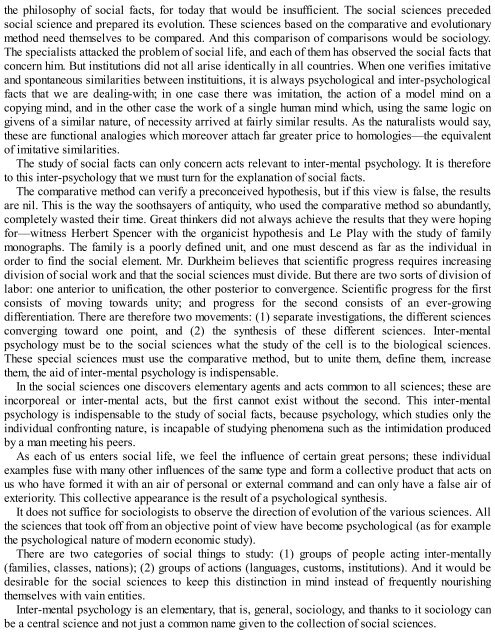3658925934
You also want an ePaper? Increase the reach of your titles
YUMPU automatically turns print PDFs into web optimized ePapers that Google loves.
the philosophy of social facts, for today that would be insufficient. The social sciences preceded<br />
social science and prepared its evolution. These sciences based on the comparative and evolutionary<br />
method need themselves to be compared. And this comparison of comparisons would be sociology.<br />
The specialists attacked the problem of social life, and each of them has observed the social facts that<br />
concern him. But institutions did not all arise identically in all countries. When one verifies imitative<br />
and spontaneous similarities between instituitions, it is always psychological and inter-psychological<br />
facts that we are dealing-with; in one case there was imitation, the action of a model mind on a<br />
copying mind, and in the other case the work of a single human mind which, using the same logic on<br />
givens of a similar nature, of necessity arrived at fairly similar results. As the naturalists would say,<br />
these are functional analogies which moreover attach far greater price to homologies—the equivalent<br />
of imitative similarities.<br />
The study of social facts can only concern acts relevant to inter-mental psychology. It is therefore<br />
to this inter-psychology that we must turn for the explanation of social facts.<br />
The comparative method can verify a preconceived hypothesis, but if this view is false, the results<br />
are nil. This is the way the soothsayers of antiquity, who used the comparative method so abundantly,<br />
completely wasted their time. Great thinkers did not always achieve the results that they were hoping<br />
for—witness Herbert Spencer with the organicist hypothesis and Le Play with the study of family<br />
monographs. The family is a poorly defined unit, and one must descend as far as the individual in<br />
order to find the social element. Mr. Durkheim believes that scientific progress requires increasing<br />
division of social work and that the social sciences must divide. But there are two sorts of division of<br />
labor: one anterior to unification, the other posterior to convergence. Scientific progress for the first<br />
consists of moving towards unity; and progress for the second consists of an ever-growing<br />
differentiation. There are therefore two movements: (1) separate investigations, the different sciences<br />
converging toward one point, and (2) the synthesis of these different sciences. Inter-mental<br />
psychology must be to the social sciences what the study of the cell is to the biological sciences.<br />
These special sciences must use the comparative method, but to unite them, define them, increase<br />
them, the aid of inter-mental psychology is indispensable.<br />
In the social sciences one discovers elementary agents and acts common to all sciences; these are<br />
incorporeal or inter-mental acts, but the first cannot exist without the second. This inter-mental<br />
psychology is indispensable to the study of social facts, because psychology, which studies only the<br />
individual confronting nature, is incapable of studying phenomena such as the intimidation produced<br />
by a man meeting his peers.<br />
As each of us enters social life, we feel the influence of certain great persons; these individual<br />
examples fuse with many other influences of the same type and form a collective product that acts on<br />
us who have formed it with an air of personal or external command and can only have a false air of<br />
exteriority. This collective appearance is the result of a psychological synthesis.<br />
It does not suffice for sociologists to observe the direction of evolution of the various sciences. All<br />
the sciences that took off from an objective point of view have become psychological (as for example<br />
the psychological nature of modern economic study).<br />
There are two categories of social things to study: (1) groups of people acting inter-mentally<br />
(families, classes, nations); (2) groups of actions (languages, customs, institutions). And it would be<br />
desirable for the social sciences to keep this distinction in mind instead of frequently nourishing<br />
themselves with vain entities.<br />
Inter-mental psychology is an elementary, that is, general, sociology, and thanks to it sociology can<br />
be a central science and not just a common name given to the collection of social sciences.









![Genki - An Integrated Course in Elementary Japanese II [Second Edition] (2011), WITH PDF BOOKMARKS!](https://img.yumpu.com/58322134/1/180x260/genki-an-integrated-course-in-elementary-japanese-ii-second-edition-2011-with-pdf-bookmarks.jpg?quality=85)
![Genki - An Integrated Course in Elementary Japanese I [Second Edition] (2011), WITH PDF BOOKMARKS!](https://img.yumpu.com/58322120/1/182x260/genki-an-integrated-course-in-elementary-japanese-i-second-edition-2011-with-pdf-bookmarks.jpg?quality=85)





